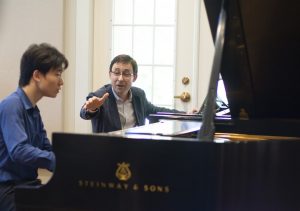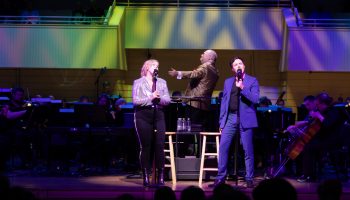
MHARI SHAW/STAFF PHOTOGRAPHER
Though Ludwig van Beethoven, Robert Schumann and Johannes Brahms have been dead for many years, their music is alive and well in the hearts and hands of Chautauqua’s musicians.
The music of these three great German composers will come to life at 8:15 p.m. tonight, July 10, in the Amphitheater, when Van Cliburn gold medalist Alexander Kobrin performs their work in a solo piano recital.
Kobrin, an internationally renowned pianist, will play three works: Beethoven’s Sonata No. 1, Schumann’s Waldszenen, Op. 82 (Forest Scenes) and Brahms’ Sonata No. 3, Op. 5.
Beethoven’s Sonata No. 1 is an interesting piece, Kobrin said, because it breaks from the traditional sonata format by having four movements instead of three. Beethoven was more willing than his predecessors, such as Joseph Haydn (who he dedicated the piece to) and Wolfgang Amadeus Mozart, to experiment with the structure of the sonata; he was innovative for his time in his approach to composition. Kobrin finds the piece to be “brave, brilliant and intense.”
Schumann’s Waldszenen, a collection of nine short piano pieces, is rather pastoral and focused on the portrayal of nature, thus the title “Forest Scenes.” The importance of nature is a common characteristic of Romantic composers like Schumann. But the set also has its darker moments, with some pieces ruminating on graveyards and death.
“Here you have a reflection of Schumann’s personality, which would take him to a very extreme state of mind in a very limited amount of time,” Kobrin said. “From one quick piece to another, you get this very hot and cold sweat, so to speak.”
The alternation between light and dark, and the quick transitions between contrasting imagery brings a psychological element to the set, which Kobrin finds fascinating.
“I think it’s very exciting not only to play, but to listen (to),” Kobrin said.
Brahms’ Sonata No. 3 is a “remarkable piece” because it has five movements; with two more than the traditional sonata, it is as long as a symphony. It is one of the sonatas that Brahms wrote at a very young age, before he turned 20.

MHARI SHAW/STAFF PHOTOGRAPHER
“This sonata also has very interesting experiments,” Kobrin said. “For example, the fourth movement serves as a memory — it’s actually called ‘memory’ or ‘remembrance’ — and the motive comes from the second movement of this sonata.”
Although the piece is meant for only one or two instruments, Kobrin said it captures the feel and sound of a full symphonic orchestra.
“It’s a beautiful piece, no doubt one of Brahms’ highlights, I think,” Kobrin said.
Though there is not necessarily a clear theme across all the pieces, there is a connection between the composers. Schumann and Brahms were peers and close friends, and both were admirers of Beethoven, who influenced them significantly. Additionally, all three are German composers; Kobrin chose their work because he is fond of German classical music.
This will be Kobrin’s second year visiting Chautauqua, and his first time performing on the Amp stage. Kobrin is excited to perform here for the same reason he is excited to perform anywhere: the thrill of sharing the music, and being a part of the music.
“It’s like time travel or travel into a completely different world — and most importantly, many different worlds,” Kobrin said. “This journey really excites me, that’s why I do this; it’s like breathing the best air possible.”
Kobrin gave a master class to School of Music piano students on Monday, but tonight’s will be his last public performance before his guest residency at Chautauqua ends this weekend.
“I always hope that the audience finds something for themselves,” Kobrin said. “Music is a very subjective thing, and it’s like a story with no words. … I hope that they will be moved.”




